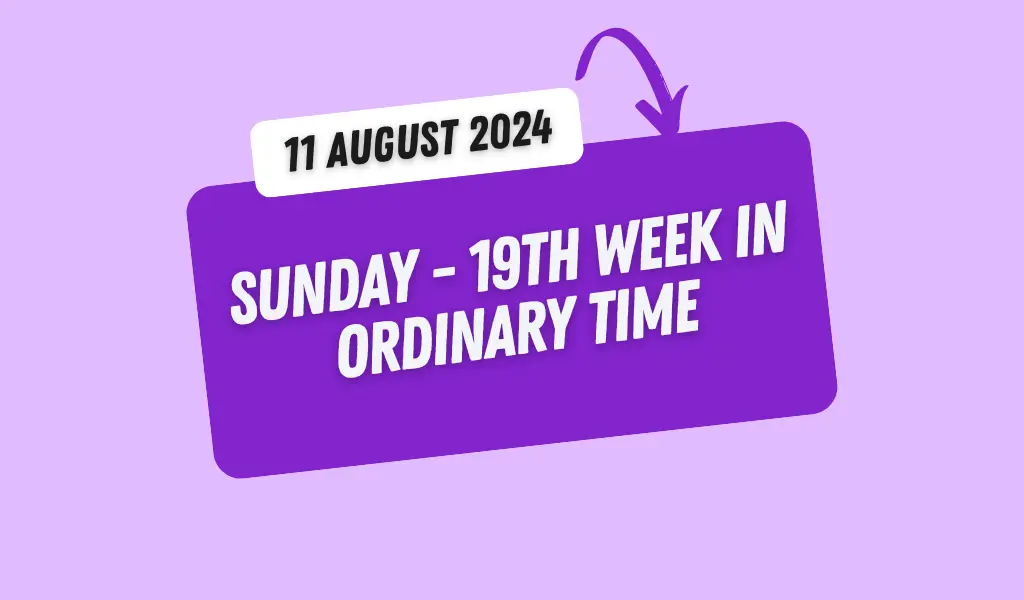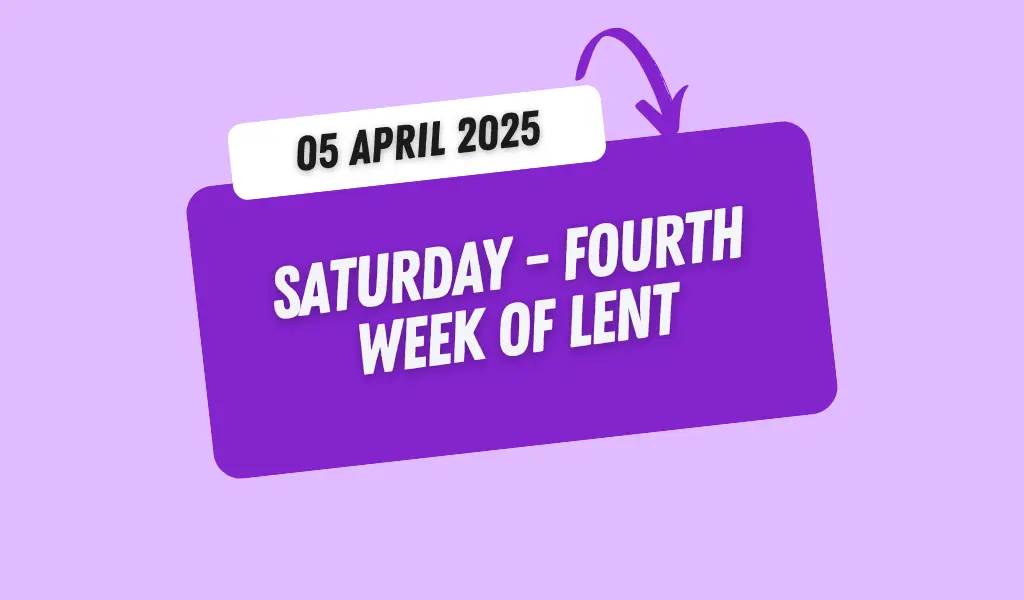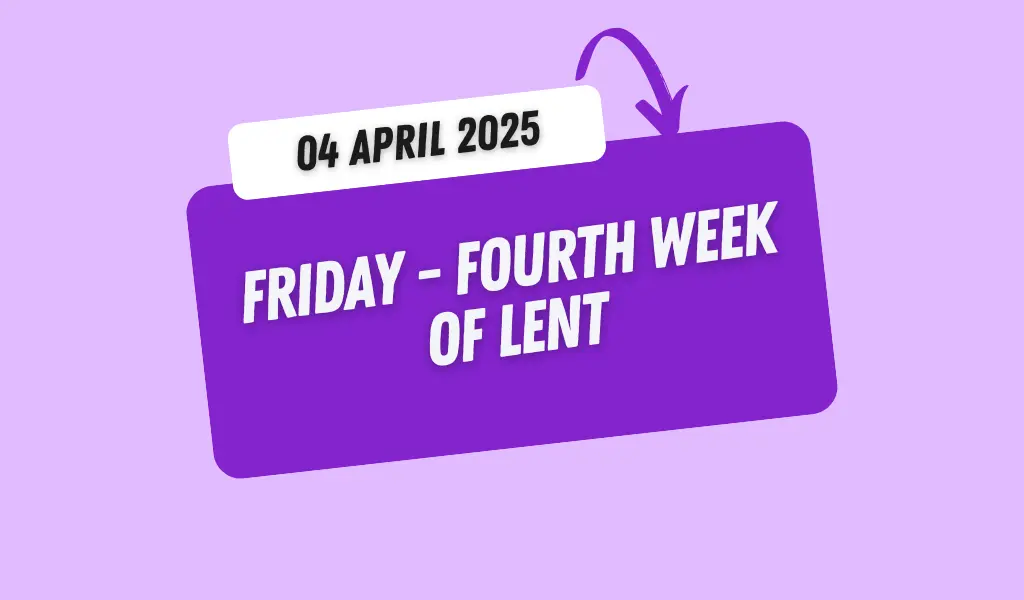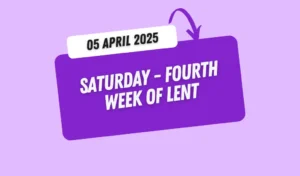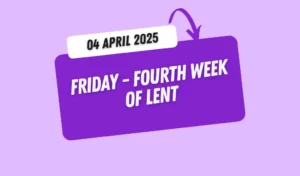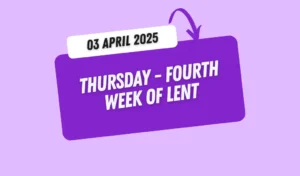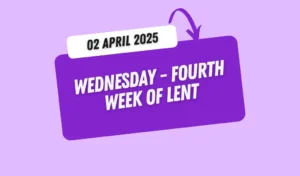Catholic Mass Readings and Reflection August 11, 2024
Nineteenth Week of Ordinary Time
11th August 2024 (Sunday)
Psalter: Week 3
Reading of the Day
First Reading: 1 Kings 19:4-8
In those days: Elijah went a day’s journey into the wilderness and came and sat down under a broom tree. And he asked that he might die, saying, “It is enough; now, O Lord, take away my life, for I am no better than my fathers.” And he lay down and slept under a broom tree. And behold, an angel touched him and said to him, “Arise and eat.” And he looked, and behold, there was at his head a cake baked on hot stones and a jar of water. And he ate and drank and lay down again. And the angel of the Lord came again a second time and touched him and said, “Arise and eat, for the journey is too great for you.” And he arose and ate and drank, and went in the strength of that food forty days and forty nights to Horeb, the mount of God.
Psalm 34:2-3, 4-5, 6-7, 8-9 (R. 9a)
R/. Taste and see that the Lord is good
Second Reading: Ephesians 4:30-5:2
Brethren: Do not grieve the Holy Spirit of God, by whom you were sealed for the day of redemption. Let all bitterness and wrath and anger and clamour and slander be put away from you, along with all malice. Be kind to one another, tender-hearted, forgiving one another, as God in Christ forgave you. Therefore be imitators of God, as beloved children. And walk in love, as Christ loved us and gave himself up for us, a fragrant offering and sacrifice to God.
Gospel Acclamation
V/. Alleluia
R/. Alleluia
V/. . I am the living bread that came down from heaven, says the Lord; if anyone eats of this bread, he will live for ever
R/. Alleluia.
Gospel : John 6:41-51
At that time: The Jews grumbled about Jesus, because he said, “I am the bread that came down from heaven.” They said, “Is not this Jesus, the son of Joseph, whose father and mother we know? How does he now say, ‘I have come down from heaven’?” Jesus answered them, “Do not grumble among yourselves. No one can come to me unless the Father who sent me draws him. And I will raise him up on the last day. It is written in the Prophets, ‘And they will all be taught by God.’ Everyone who has heard and learned from the Father comes to me – not that anyone has seen the Father except he who is from God; he has seen the Father. Truly, truly, I say to you, whoever believes has eternal life. I am the bread of life. Your fathers ate the manna in the wilderness, and they died. This is the bread that comes down from heaven, so that one may eat of it and not die. I am the living bread that came down from heaven. If anyone eats of this bread, he will live for ever. And the bread that I will give for the life of the world is my flesh.”
Daily Gospel Reflection
Sunday – Nineteenth Sunday of Ordinary Time
Guidelines: True love lives forever and promotes life. Those who live in love are truly the bearers and testimonies of life
1. “Life out of love and love out of life”. This can be the whole summary of God and His relation to us. It is God who gives us life. The life we enjoy is His. This life is given to us because He loves us. True love shares its very self with others.
2. Therefore, the God who is love and who loves us immensely, shares His own life with us. Thus, we live in love. Our life can be truly meaningful only to the extent we live in God and in His love. Those who do not bear the marks of divine life and love are contrary to their very nature, essence and purpose of life.
3. Seen in this optic, love is both the beginning and the end, the foundation and culmination of life by God. It means, it is because of God’s love we live, and love alone will be the sign and proof that we live.
4. Today, Jesus declares, “I am the bread from heaven, bread that gives life” “Those who eat me will not die but will live forever”. This implies many elements that we have been reflecting. First, it is from heaven. Thereby, it is divine and not something earthly, material like manna in the Old Testament.
5. Second, it is a bread that gives life forever. Thereby, it is not something temporary and temporal. Those who eat ordinary bread die, and those who ate manna in the desert died. But those who eat this bread that Jesus speaks of, will live eternally.
6. Third, this is not a material bread, but Jesus himself. Jesus identifies himself with this bread of eternal life. He also clearly says that his own flesh is the bread. What does this mean? Here we need to avoid both the tendencies that can be defective. One is only literal and material, and the other, only metaphorical and symbolic.
7.Taken in the first sense, the eating of the flesh may be reduced to crude cannibalism. We are not eating the human flesh of Jesus. But at the same time, it is not merely symbolic. We are REALLY receiving, sharing the body of Jesus.
8. Here comes the whole beauty, depth and the mystery of the holy Eucharist. The presence of Jesus in the holy Eucharist which is the eternal bread of life is SACRAMENTAL. Jesus is truly, really and substantially present in the most holy Eucharist. The holy Eucharist not only symbolizes the body of Christ, but IS the body of Christ.
9. In fact, the flesh of Christ can also be understood as the humanity as in John 1. 14: The Word became flesh and lived among us. This is what gives us life. Thus there is a marvellous blend of humanity and divinity. Humanity taken up in love and giving life of divinity!
10. Now, we can revert back to our initial reflection on love and life. If Jesus becomes our bread of life out of love, love becomes the authentic and concrete sign, effect and expression of this life. In other words, the divine life that flows into us shows itself in a life of love.
11. But again how to recognize this love? What are its features or identity marks? The second reading from Ephesians 4. 30 – 5. 2 gives the answers. Such a love is shown in Christ-like self-giving. This further manifests itself in putting away what is negative and putting on what is positive. Get rid of all malice, bitterness, anger and slander. Instead, be kind, tender and forgiving.
Practice: A God-given life is seen in a life in love which alone pleases God and testifies that are marked by God’s ownership
